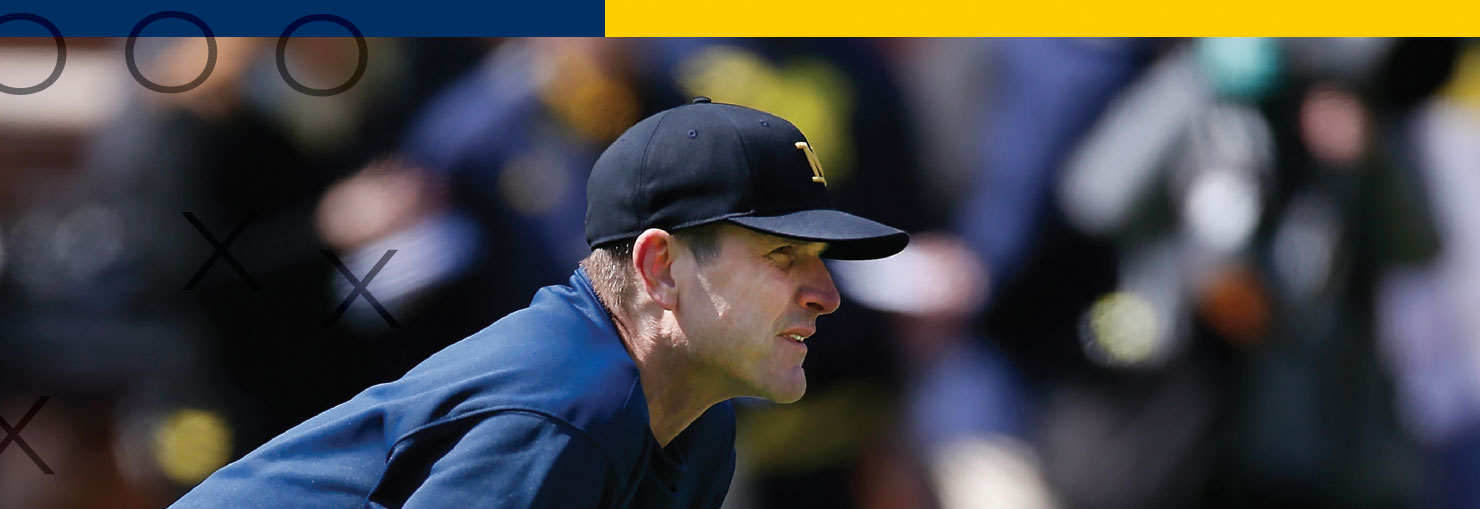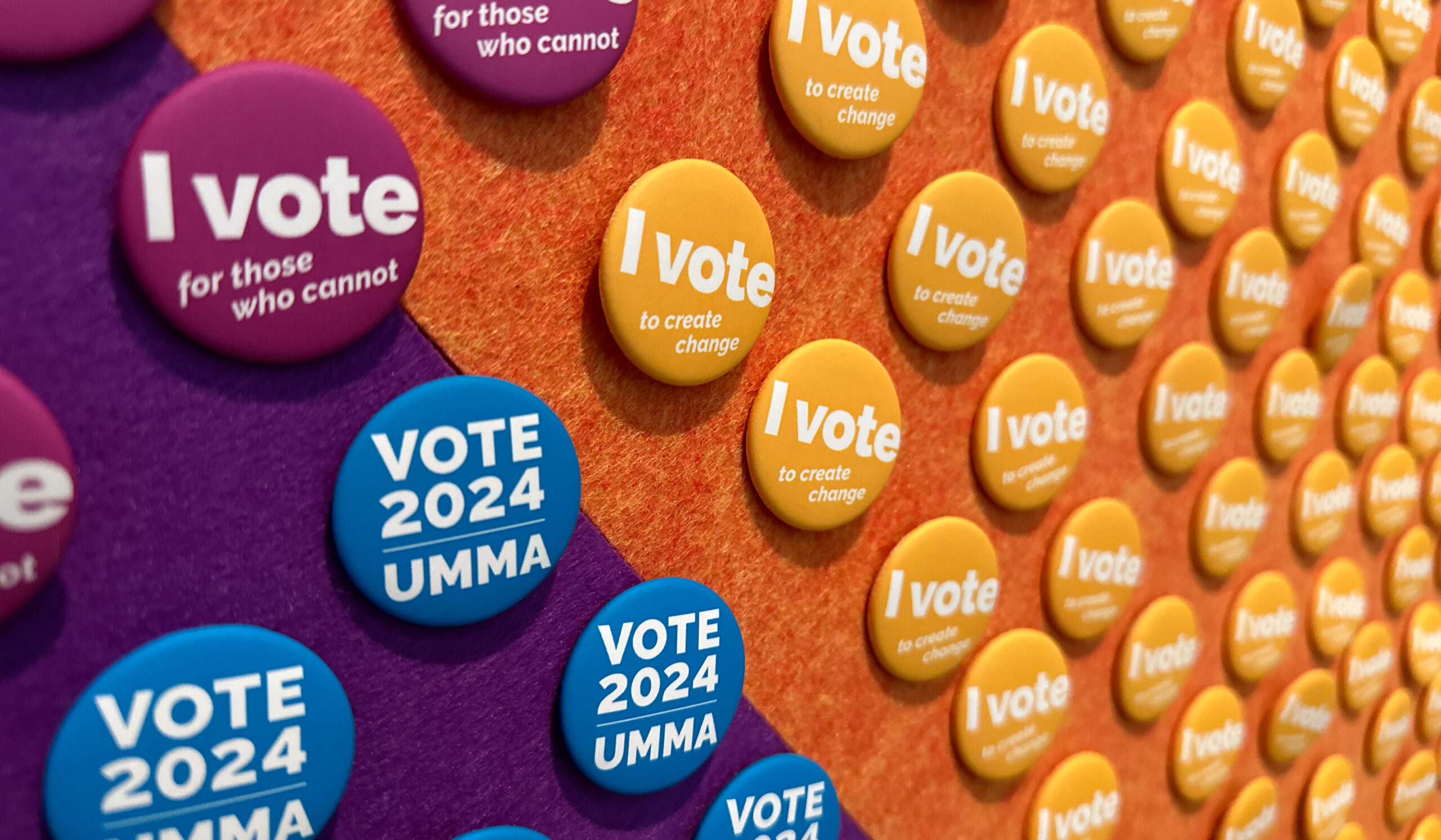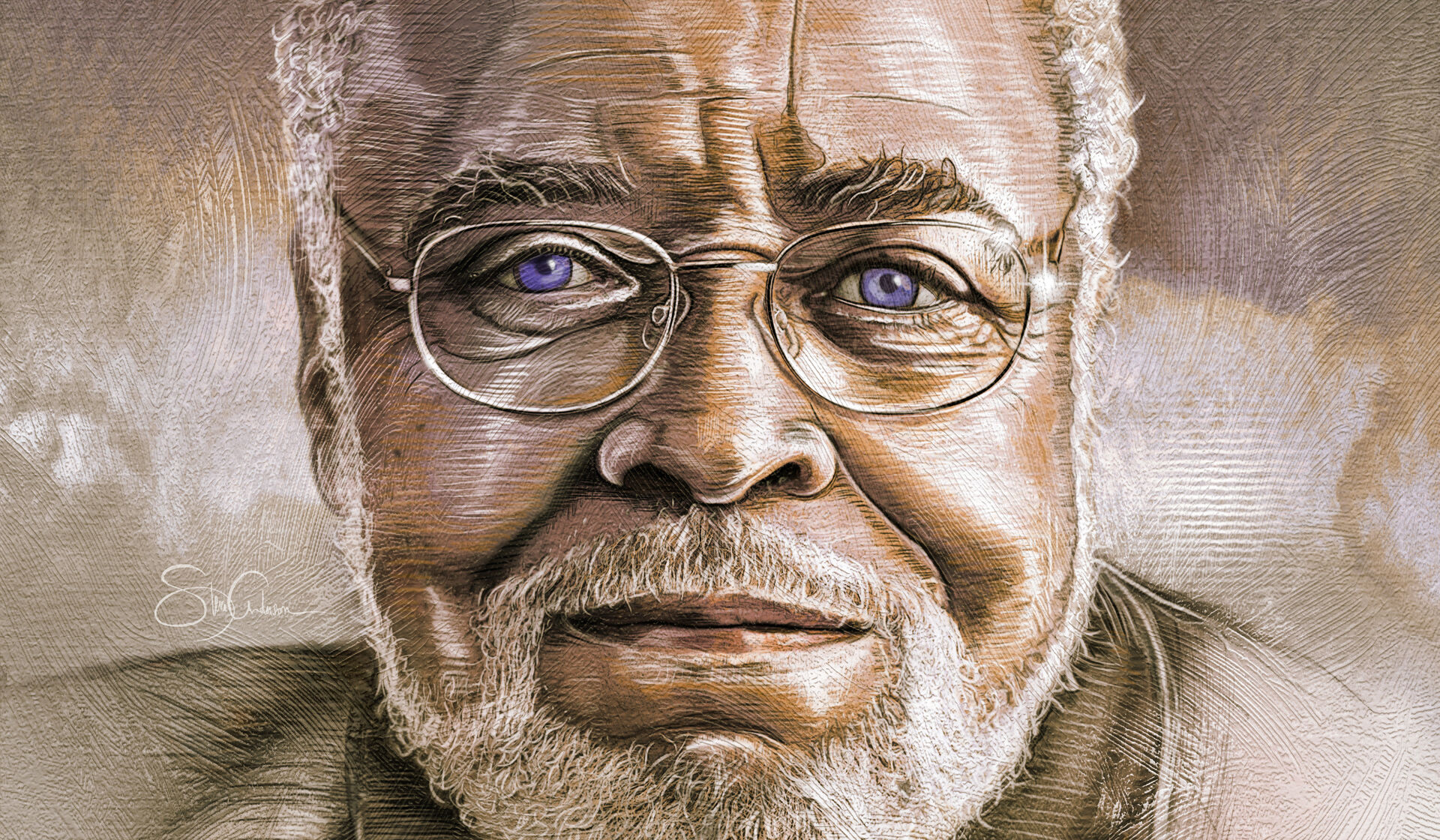On Sept. 3, Jim Harbaugh steps onto the field at Rice-Eccles Stadium in Salt Lake City in his first game as U-M’s head football coach. Excitement has been building for this moment ever since Dec. 30, when fans learned that Harbaugh, ’86, would become Michigan’s 20th head coach. Michigan Alumnus gave some of those fans—all Alumni Association members— an opportunity to ask the coach about anything, from his college days to whether he’ll call plays on game day. We share his responses here.
After having success at the professional level with the 49ers, to what extent are you planning to incorporate your professional football knowledge into Michigan football (practices, game planning, offensive/ defensive play calling/schemes, etc.)? –Brian Cha Fong, ’87
We have a mantra in our family, “Attack every day with an enthusiasm unknown to mankind.” This reflects not living in the past and not living in the too-distant future. We are evaluating our present talent, designing strategy and schemes for our 2015 talent. We evaluate our day’s progress every day. That which works, we improve and make better. That which doesn’t work and can’t be improved, we eliminate. Hence, better tomorrow than today.
Welcome back. I know we will have an offensive coordinator in Tim Drevno and passing game coordinator in Jedd Fisch. Will you be calling the plays on game day or defer to either of them? – John Lynch, ’01
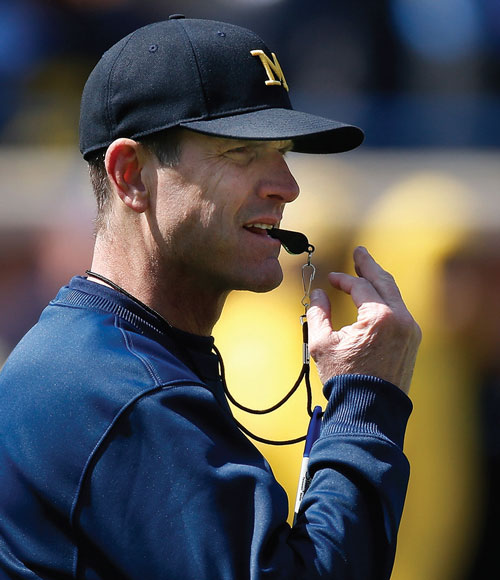
We are blessed to have an outstanding staff. After six months, I could not be prouder of the staff assembled. We are designing a system of calling plays that will utilize the talents of our offensive staff.
Much of the play calling work is done in the week of the game by the offensive staff. Through extensive film study, plays are decided upon based on down and distance, field possession, first plays of a new series, red zone plays, goal line plays, etc. On game day, it is a matter of selecting a play call from a very limited number of plays.
How do you instill your competitive spirit in those you coach? But, more importantly, how do you do this and make sure they still have a strong set of values and ethics? How do you get them to tackle each day with “enthusiasm unknown to mankind”? – Jennifer Steben, ’96
It is not my role or purpose to instill a competitive spirit in those with whom we work. We tried very hard to assemble a staff of good people who possess values, who work hard, who have good ethics, and who are willing to work and learn from each other. We want to cast a wide net to recruit young men to our University who share those same qualities. It is so much easier “to attack the day with enthusiasm” when you are pulling in same direction.
What is your approach toward improving the academic performance of student-athletes, including graduation rates and fostering success off the football field? – Lisa Simms, ’88
It truly is a process. The process begins by putting together a staff who believes in the collegiate model “student- athlete.” The process continues by casting a wide net across our country and “mining” for young men and families who have the value system and skill set to be successful academically, athletically, and socially. On campus, a staff must be in place to provide the support to complete the process of academic and athletic success.
Our goal is to return these young men to their communities and families with a meaningful University of Michigan degree that will allow them to lead happy and productive lives and fulfill their football dream.
Of all the factors you considered before making the decision to accept the head coaching position at Michigan, was there one issue or argument that tipped the balance to come back now? – Adrienne Reilly, ’59
Looking back, there was a discussion. My wife, Sarah, and I sat down to discuss the decision, and I shared with her those seven years I spent in Ann Arbor when dad was coaching with Bo and the great childhood memories from those years. I talked about the five years playing in our great stadium and the memories with my coaches and teammates. Sarah looked at me and said, “We’re going to Ann Arbor.” So good to be home.
Excluding the athletic facilities, what is your favorite part of the University of Michigan campus? –Josh Muss, ’14
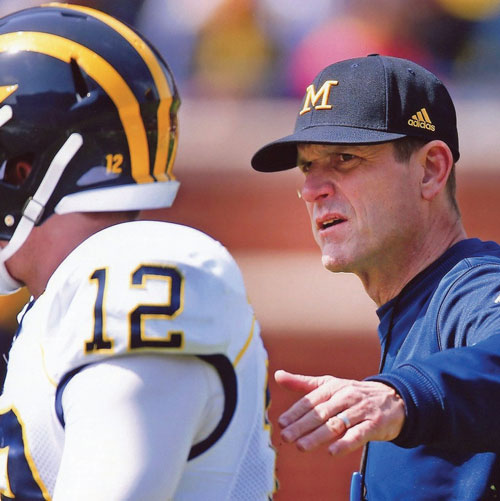
Of course, classes in Angell Hall and/or living in South Quad would be good answers to your question. Walking through campus would be good, but I will take this question in a different direction. When I was in ninth and 10th grade, my brother, John, and I found creative ways to sneak into the IM building next to the coaches’ office on State Street. There, we got into some highly contested basketball games. Those were games when winners stayed and losers had to sit and wait for their turn. In those games, I was usually paired up against John and he is a fierce competitor. We would carry those games home, upsetting mom. We still discuss who was or wasn’t fouled in a critical situation.
You had incredible success recruiting talent at Stanford with a limited potential population. At Michigan, will you go head-to-head with the SEC and will you tailor your recruiting to what the University has to offer? – Chuck Preseau, ’84
We believe in the University of Michigan. We shy away from no conference, no other university in the United States of America! We have a world-class academic University, and we are recruiting student-athletes who seek a world class education! We have a University that has won more football games than any university in the country. No one has won more! We play in the Big Ten with the opportunity to compete for the National Championship. We live in a community that provides a great college experience. We fear no conference. We fear no college program. We Are Michigan!
I worry that the intensity of programs leading to college, but through college and beyond, has affected the health of the boys who take up the sport. How do we support neurological health, as well as general health, and still have football as a game to enjoy? – Nancy Lyon, ’87
The game of football is in stress, because of injuries and the focus on injuries that has rightly been placed on them. Head injuries are a legitimate concern. We are making great strides in protecting our young men. We have and continue to produce better and safer equipment. We have revised and are enforcing rules to protect at-risk players, and to your point, research and studies are being conducted for greater safety. We at the University of Michigan will always place the health and safety of our athletes as our number-one priority.
Welcome home, Jim! What do you think are the three key things you learned from Bo during your Michigan playing years that you now hope to leverage during your Michigan coaching years? – Chandler Simonds, ’91
The three things learned from Bo:
- the team, the team, the team After two years being coached by Bo and the staff, it became crystal clear my value to the team was not in my individual statistics. I was being evaluated and my playing time would be determined by my ability to lead the team to victory as the QB—no turnovers, no negative plays, establishing field position, and the team putting the ball in end zone.
- competition Bo was the consummate competitor. He created competition in practice to measure your competitive drive. He wanted to know who would compete in practice because he didn’t want to find out on Saturday in front of 101,001 people.
- care for his coaches and players on and off the field He knew and asked about your family; he knew how each player was doing in class and with whom they were associating. Why? Because he cared.
Jim, of all the U-M memorabilia you have from over the years, what is your favorite? – Michael Birkholm, ’73
In my office, I have one prominent picture. In a heated moment during a time out, Bo has me by the front of the jersey with his right hand and is giving his very animated wisdom. Bo’s intensity in the picture brings me memories of his love and passion for the game and the trust and belief he had in me, allowing me to QB his team. Every day, I see that picture and feel his presence and draw on that presence.
The first-year expectations have been set extremely high. It usually takes three-plus years to reach a consistently successful college record. How will you go about managing expectations? – A.E. “Gene” Stoffel, MBA’75
I know this is redundant, but it is simple— something I believe in and just simple enough that it just may work: “Better today than yesterday, better tomorrow than today.” We are looking for a 1 percent improvement today, just 1 percent. To improve 1 percent today, you must give today 100 percent effort. We can’t concentrate on Utah until we get 1 percent better today and 1 percent better tomorrow.

